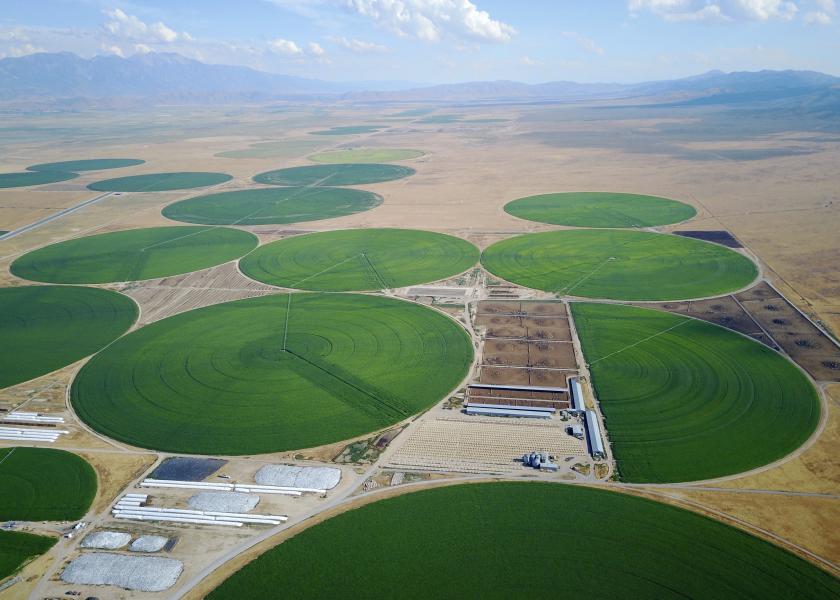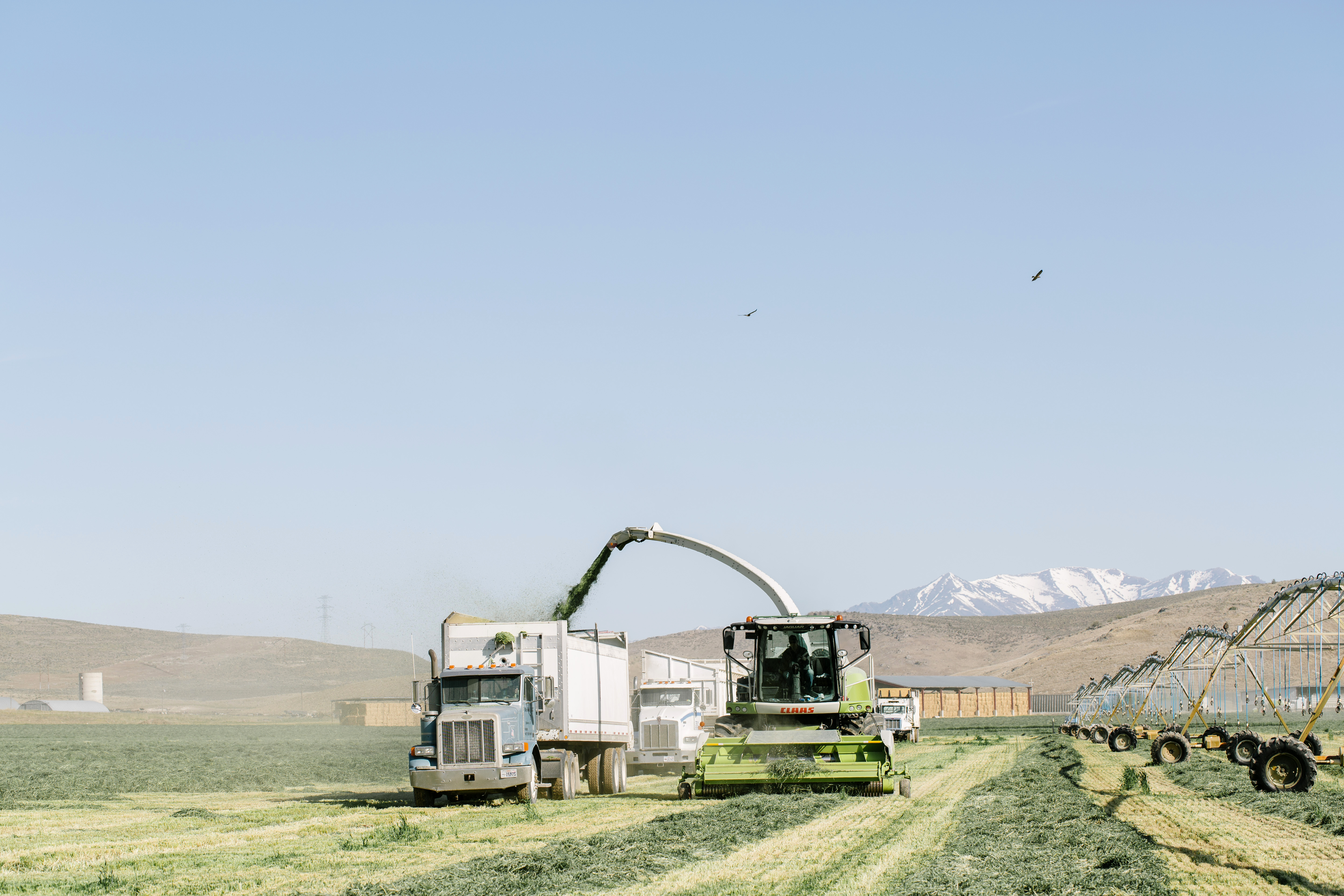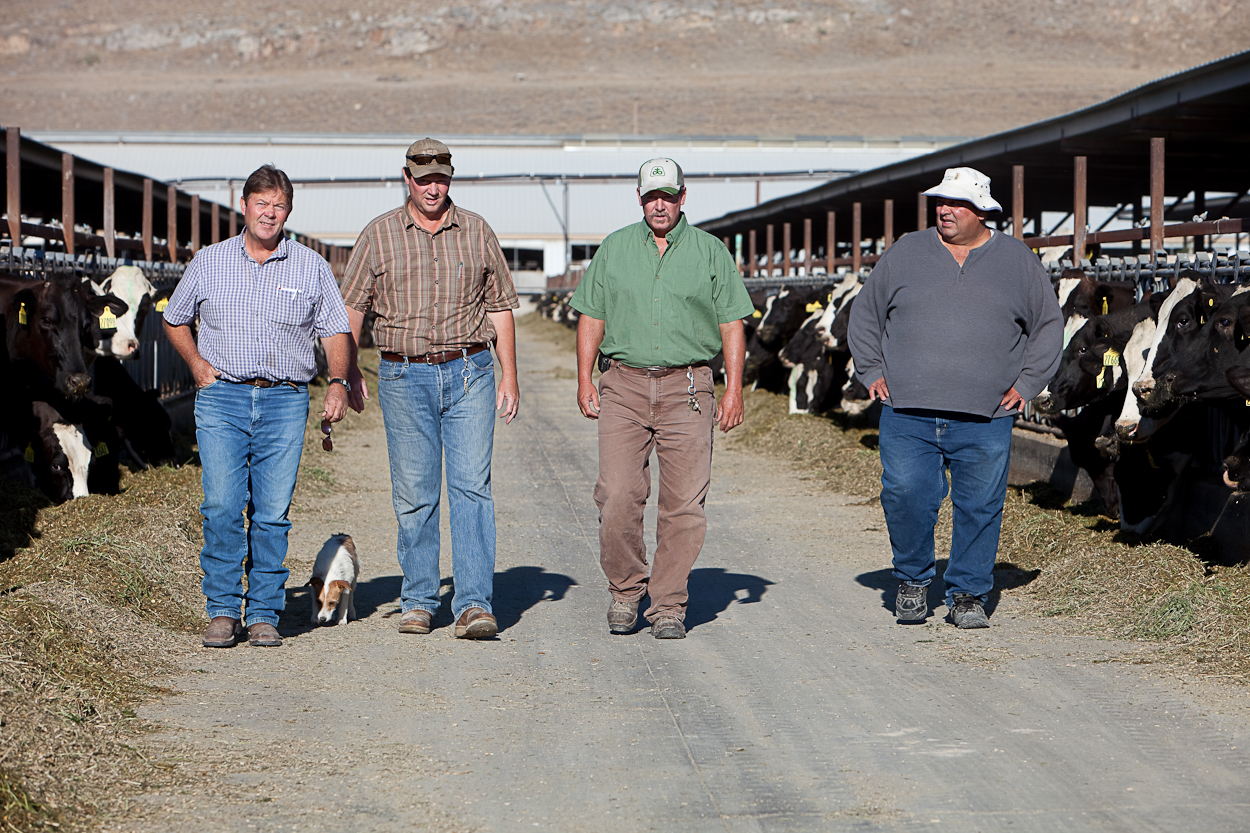On the Lookout for Opportunity

Travel to the southwest tip of Utah Lake, where Bateman’s Mosida Farms LLC is located, and you will not only see the largest dairy in the state, but you will see a bond of brothers and their families who worked extremely hard and who have honed in on innovation and sustainability to better care for their cattle and land. The Bateman family has taken major steps in the last decade to implement innovative growth strategies that provide more sustainability reassurance for the family’s 12,000-cow dairy farm housed on four different sites, 2,000-head of beef with two separate feed yards and 3,500 acres of cropland. All of this has earned Mosida Farms the honor of being named the 2024 Innovative Dairy Farmer of the Year by the International Dairy Foods Association (IDFA).
Keeping Eyes Open to Opportunity
The Bateman family has not let grass grow under their feet in any shape or form, as they have taken on numerous projects over the last several years.
Operating on the principles of sustainability and animal care that were passed down by previous generations, today Bateman’s Mosida Farms in Mosida, Utah, is owned and operated by the four families of Steve, Brad, Jason and the late Lance Bateman. The farm continues the family mantra of progression; always keeps its eyes open to opportunity.
The Bateman family says that sustainability and efficiency go hand-in-hand when it comes to keeping the family business afloat in the global market.
"Sustainability is important because it is looking with hope to the future,” Brad Bateman says. “What we do matters. It matters for the cows and for the land that we are stewards over. Another piece to being sustainable is profitability. We must be profitable in order to continue this family business for future generations."
Solar Power
Environmental stewardship has a big role on the farm and the Batemans wholeheartedly believe everything must be sustainable. Since 2013 the Bateman family has also been operating a 600-kW solar array on their dairy operation allowing them to produce clean energy for the dairy, as well as the local community.
“We felt like as a hedge to the future that we would produce a percentage of our electricity here and pull that off the grid and control a portion of our electricity through the solar system,” Jason Bateman said.

The Bateman brothers are reminded of words of advice from their father, who always taught them to look towards the future and try to be progressive.
"Our dad always said you can't stand still,” Brad recalls. “You always have to be learning, growing, and getting better. He often told us to get out there and learn. Go see how we can improve. This approach has certainly played into our drive for sustainability."
Growing More with Less
In 2019, Bateman’s began a partnership to start a commercial-scale vertical controlled environment agriculture feed center. The Olympus Tower Farm test facility was only 857 square feet but produced 5,000-6,000 lbs. of sprouted wheat/barley grass per day which is the equivalent of 35-50 acres of conventional farming. This helped provide nutritious fed and improved production, especially in early lactation animals.
However, the Batemans share that unfortunately their partner decided to focus their efforts on other areas and the test facility was shattered.
“We are exploring the possibility of implementing another one in the future because we see great potential,” Brad shares.

Meat Processing Facility
The Batemans decided to diversify and added beef to their offering in 2020. Mosida Farms produces 100 beef calves weekly and those calves are fed and eventually sold in one of the Mosida Market locations.
In 2021, the dairy acquired a meat processing facility, allowing them to vertically integrate their meat production and deliver fresh local meat directly to local consumers. The integration has allowed the operation to grow economically and open a second market location in Provo, Utah.
The family has utilized various genetics to come up with the best beef on dairy cross for their market and Mallary Bateman, Brad’s daughter, shared that so far, the Wagyu cross is the flagship meat in the market.
“Mosida Market was just our family selling beef to our neighbors before it evolved to where it is today,” Mallary shares.
Robot Barn
A labor shortage nudged the Bateman family to put a new, climate-controlled robotic dairy barn that milks 820 cows in 2022. This has allowed the family to reduce labor costs and improve overall efficiency.
“At some point, we plan to implement phase two and add another 16 robots and 1,200 cows to the facility,” Brad shares, noting that several cows consistently produce more than 200 lbs. of milk a day at this facility.
Comprehensive Nutrient Management Plan
The dairy also enrolled in Utah’s Agricultural Voluntary Inventive Program in 2022, allowing them to implement a comprehensive nutrient management plan on all 3,500 acres of crop ground that they own and operate. This plan ensures that they are following all State and Federal water quality regulations and helps them protect nearby Utah Lake from excess nutrient loading. Utah Lake is a high-profile lake that is currently impaired for several beneficial uses and is undergoing a water quality study.
Additionally, Batemans are currently in the process of implementing a multi-million-dollar project to expand their waste storage facilities, install a centrifuge to treat their waste stream more effectively and construct earthen structures to further prevent any nutrients or stormwater from entering nearby Utah Lake.
The Batemans believe manure management and storage is important on any dairy farm because of the resources and assets that manure has as a nutrient.
“We feed the cows and process the manure and water that then returns to the ground. This creates an amazing sustainable cycle of nutrients that first goes to the cows, then to the soil, and finally back to the cows,” Brad explains.
Community and Industry Leaders
Looking to the future, the Batemans are committed to educating their community about the importance of agriculture and showcasing the industry in a positive light.
Katie Slebodnik, the Agricultural Voluntary Incentive Program Manager with the Utah Department of Agriculture and Food shared in her nomination that Bateman’s stand apart from their peers in countless ways.
“As the largest dairy in the state, many smaller local Utah dairies look to them to pilot new technologies so they can understand their value,” she says. “The Batemans also travel extensively to various states and countries around the world multiple times a year, looking for new practices and technologies to try.”
Mallary Bateman recalls that her family would always get in a car and drive—to Idaho or other states to learn from other dairy producers.
“How can we improve? What can we learn? We always have taken that approach and then turned it around to help others,” she shares. “Vacations always turn into an opportunity to see other dairies that helped enhance our operation.”
Tips to Other Farm
The Bateman family is not only proud of their heritage but also proud of the dairy business they have built for themselves. When looking to the future, they feel blessed that a second generation is working on the farm to help continue the family legacy.
Steve Bateman encourages other producers to provide opportunities for the younger generation to come back to the farm.
“You have to work to make it possible for your kids to continue the business, and get them involved early to keep them there,” he says.
The investment Batemans have put forward to drive their dairies forward in terms of sustainability and profitability is indeed admirable. The Batemans share that there are many ways to do the same thing—not only across the U.S., but across the world.
“Hopefully we can learn from one another to find the best way in each area to do some of the things we do daily,” Brad shares. “An industry goal should be to create enduring family farms that can stand the test of time and truly become sustainable farms.”








